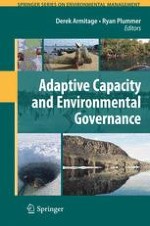2010 | OriginalPaper | Buchkapitel
11. Adaptive Capacity as a Dynamic Institutional Process: Conceptual Perspectives and Their Application
verfasst von : Ralph Matthews, Robin Sydneysmith
Erschienen in: Adaptive Capacity and Environmental Governance
Verlag: Springer Berlin Heidelberg
Aktivieren Sie unsere intelligente Suche, um passende Fachinhalte oder Patente zu finden.
Wählen Sie Textabschnitte aus um mit Künstlicher Intelligenz passenden Patente zu finden. powered by
Markieren Sie Textabschnitte, um KI-gestützt weitere passende Inhalte zu finden. powered by
